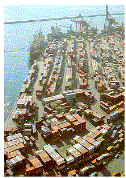| Foreign
Trade Policy and Volume
In January, 1980 Turkey accepted the
concept and principals of a free market economy. Since that time all
necessary measures have been put into force in order to realize the
main target: export -oriented industrialization. In this context, a
flexible exchange rate policy, liberal import regime, new foreign
investment policy, measures for a liberal money market and modern
capital market and new export promotion policies have been put into
force.

(1) January-October Period
Source: State Institute of Statistics
The Turkish economy showed an
impressive response to these measures, such as a rise in foreign
trade, both in exports and in imports, and a noteworthy change in
the structure of exports. The dominant role of agricultural products
in exports was ended in favor of industrial products. Also the
product range was diversified and the volume of foreign trade
increased about threefold in that decade.

In the 1990's, due to unfavourable
political and economic conditions both inside and outside the
country, Turkey's trade balance was adversely affected. On one hand
the Gulf crisis, the economic embargo against Iraq and the war in
Bosnia and on the other hand the appreciation of the Turkish Lira
and strong domestic demand all slowed down the growth rate of
exports. The recession in world markets, especially in OECD
countries, also affected Turkish exports. However, as another result
of the appreciation of the Turkish Lira and liberalized foreign
trade caused a boom in imports.
In 1994 in order to improve the
balance of payment deficit and foreign trade, new export policies
were put into force, such as: diversified export credit programs and
free market conditions for foreign exchange rate.
In 1995 Turkey made the necessary
arrangements in its foreign trade policy to conform with the Uruguay
Round Agreements as well as the Customs Union Agreement that was
signed with the EC and put into force on the first of January, 1996.
In this framework, Turkey has adopted
a large body of EU trade legislation affecting almost every aspect
of business, including the common customs tariff (CCT) which the EU
applies to industrial goods imported from other countries. Under the
customs union the following changes are occurring:
Tariffs: Turkey
has removed tariffs on imports of EU industrial goods. Apart from
textiles, the EU has done away with most duties and quotas on
industrial imports from Turkey. The free movement of goods within
the customs union applies to all products, including those imported
from third countries into either the EU or Turkey.
Customs code:
Turkey has adopted the more significant Articles of the Community
Customs Code and has been implemented the new import and export
legislation since the beginning January 1996.
Textiles: Turkey
is to abide by EU textile policy.
Motor vehicles:
Turkey has kept tariffs on cars with engines larger than three
litres above EU Common Customs Tariff levels. A monitoring system
has been set up for imports of Japanese cars.
Intellectual property:
Turkey brought copyright and patent law into line with the EU, and
is to implement the Uruguay Round rules on patents for
pharmaceutical processes and products by January 1, 1999.
Competition:
Turkey has aligned laws fully with the EU and set up an independent
enforcement agency.
Commercial policy:
Turkey to align within five years with EU policy on trade
preferences.
Agriculture:
Both sides are to work towards free trade in agricultural products
by 2005: negotiations on specific mutual concessions in the mean
time.
Social policy:
Turkey reluctantly agreed to postpone negotiations on free movement,
working conditions, employment, social entitlements and rights of
establishment of workers in the EU.
Foreign Trade Volume:
In 1994 Turkey's foreign trade volume totaled $41.3 billion
US. In comparison with the previous year, there was a 7.6% decrease
in trade volume due to the decrease in imports.
In 1993 Turkey's trade deficit
reached a record $14.0 billion US . Fortunately, in 1994 this value
fell to $5.1 billion US as a result of measures taken on April 5th
1994. On the other hand, the export/import ratio was 77 % in 1994,
while it was 52% in 1993 and 36.8% in 1980.
In the first ten months of 1995
Turkey's trade volume showed a 38.6% increase with a value of $44.9
billion US compared with $32.5 billion US in 1994 for the same
period.
Foreign Trade Of Turkey, (US
$Million)
|
1980 |
1985 |
1990 |
1991 |
1992 |
1993 |
1994 |
1995(1) |
| Export |
2910 |
7958 |
12959 |
13594 |
14719 |
15348 |
18105 |
17180 |
| Import |
7909 |
11343 |
22302 |
21047 |
22870 |
29429 |
23270 |
27816 |
| Balance |
-4999 |
-3385 |
-9343 |
-7453 |
-8151 |
-14081 |
-5165 |
-10636 |
| Exp/Imp% |
36.8 |
70.2 |
58.1 |
64.6 |
64.3 |
52.1 |
77.8 |
61.8 |
| Volume |
10819 |
19301 |
35261 |
34641 |
37589 |
44777 |
41375 |
44996 |
(1) January-October Period
Source: State Institute of Statistics
|

